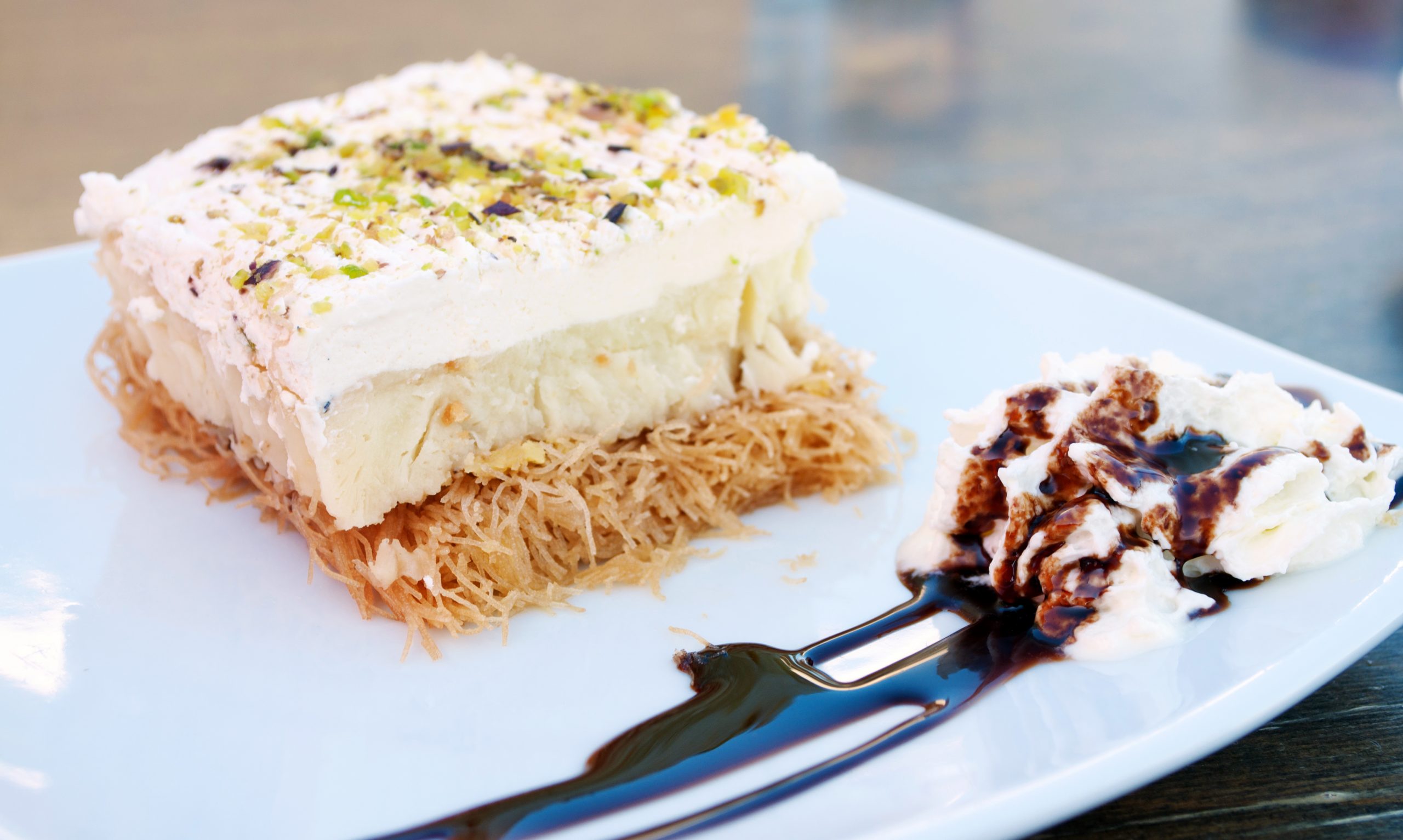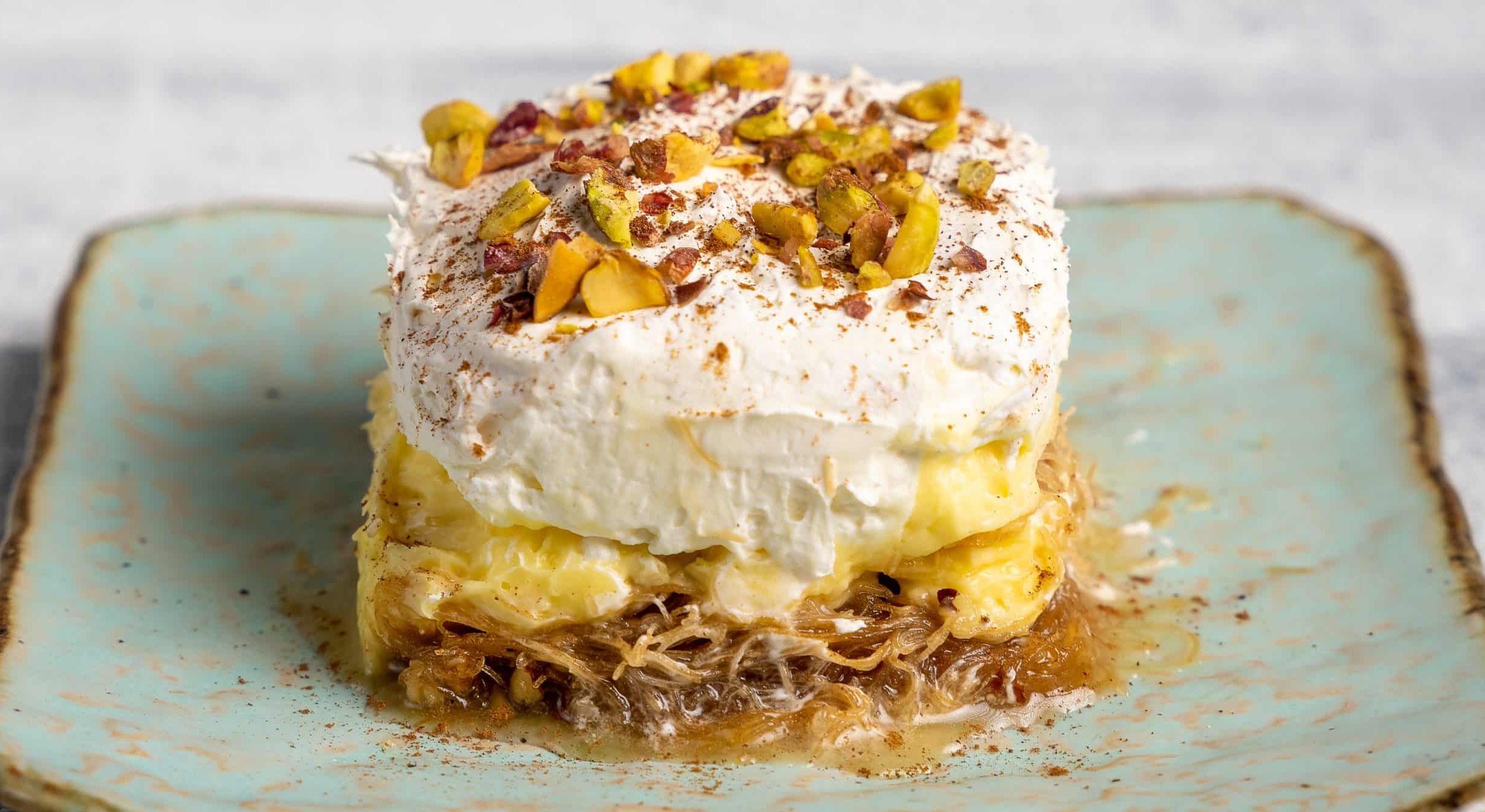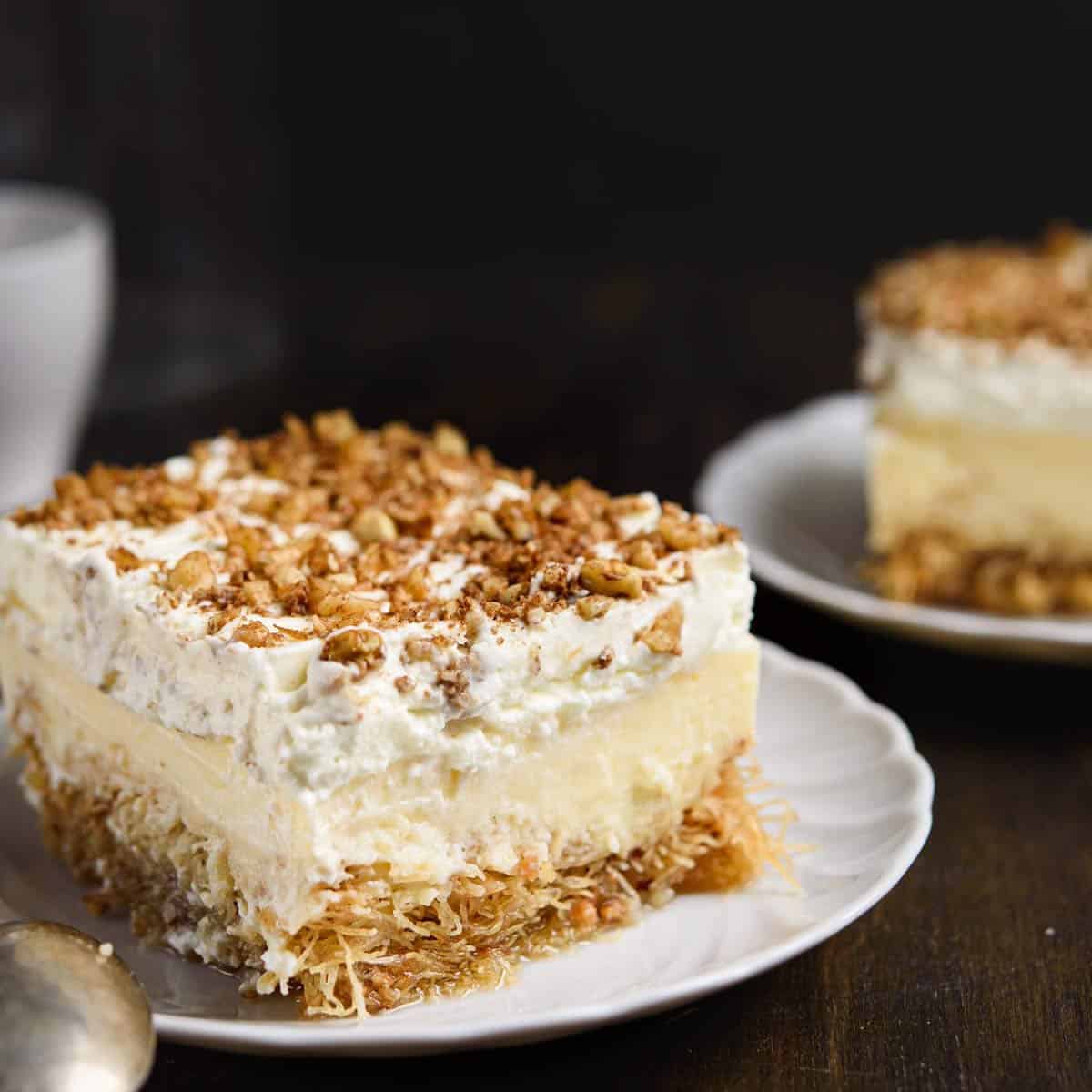Menu
Install the app
How to install the app on iOS
Follow along with the video below to see how to install our site as a web app on your home screen.
Note: This feature may not be available in some browsers.
You are using an out of date browser. It may not display this or other websites correctly.
You should upgrade or use an alternative browser.
You should upgrade or use an alternative browser.
Greek Food, Cooking and Recipe Community
How to make ekmek kataifi :)
- Thread starter dimi_pat
- Start date
1 - 10 of 10 Posts
Great video, thanks for sharing!
Here are a few printed versions of the Ekmek Kataifi recipe:

 www.greekboston.com
www.greekboston.com

 www.mygreekdish.com
www.mygreekdish.com

 www.realgreekrecipes.com
www.realgreekrecipes.com
Here are a few printed versions of the Ekmek Kataifi recipe:

Ekmek Kataifi Recipe - Custard with Whipped Cream and Pastry Recipe
Learn how to make and prepare the recipe for Ekmek Kataifi, a Greek whipped custard dessert.

Greek Ekmek Kataifi recipe (Custard and whipped cream pastry with syrup)
An absolutely delicious Ekmek Kataifi recipe! Discover how to make this traditional Ekmek dish to perfection with my extensive list of hints and tips and detailed preparation photos! Go ahead, indulge yourself!

Greek Ekmek Kataifi - Syrupy Shredded Pastry And Cream Dessert
Crispy syrupy kataifi pastry, creamy pastry cream, airy whipped cream, chopped nuts, and cinnamon. Ekmek Kataifi is one of the best Greek desserts!
 www.realgreekrecipes.com
www.realgreekrecipes.com
k_tsoukalas
Administrator
This is one of my favorite Greek desserts, but I don't know how to make it yet. Thanks for sharing these recipes!
Blue & White
Member
Ekmek is not Greek it's Turkish
cf_fraiser
Active member
I believe they still eat it in Greece thoughEkmek is not Greek it's Turkish
k_tsoukalas
Administrator
There's a blending of cultures and influences in Greece. I can adopt it as Greek if I desire.Ekmek is not Greek it's Turkish
Blue & White
Member
You can but why would you? It's Turkish.There's a blending of cultures and influences in Greece. I can adopt it as Greek if I desire.
k_tsoukalas
Administrator
How do you know for sure? Baklava is a Turkish word, as well. It's clearly a Greek dessert!You can but why would you? It's Turkish.
Blue & White
Member
Baklava is actually a Mongolian word. Baklava is Arabic, and the Turks made it theirs in the mid 1600sHow do you know for sure? Baklava is a Turkish word, as well. It's clearly a Greek dessert!
k_tsoukalas
Administrator
Oh! Yes, that is true. Thank you!Baklava is actually a Mongolian word. Baklava is Arabic, and the Turks made it theirs in the mid 1600s
1 - 10 of 10 Posts
JOIN THE DISCUSSION AND READ OTHER GREEK INFO:
Current food trends in Greece?
- dpappas87
- Greek Food Forum
- Replies: 0
I understand that Greece is just like other countries where there might be food trends, new dishes, etc to enjoy.
I'm looking to understand more about the latest trends that are currently shaping it. I'm particularly interested in how traditional Greek recipes are being reimagined by modern chefs, how regional variations are gaining popularity, or if there's a rise in any particular ingredients or cooking methods.
Is anyone here keeping tabs on contemporary movements in Greek food? Maybe you've dined at a restaurant that surprised you with a modern twist on a Greek classic, or you've come across new food blogs with innovative recipes.
The cuisine of Greece is as much about the traditional recipes we all love as it is the trends and the way the cuisine moves forward!
I'm looking to understand more about the latest trends that are currently shaping it. I'm particularly interested in how traditional Greek recipes are being reimagined by modern chefs, how regional variations are gaining popularity, or if there's a rise in any particular ingredients or cooking methods.
Is anyone here keeping tabs on contemporary movements in Greek food? Maybe you've dined at a restaurant that surprised you with a modern twist on a Greek classic, or you've come across new food blogs with innovative recipes.
The cuisine of Greece is as much about the traditional recipes we all love as it is the trends and the way the cuisine moves forward!
What are the most famous Greek cheeses?
- knicks_fan87
- Greek Food Forum
- Replies: 1
I've recently embarked on a culinary quest to explore the rich and diverse world of Greek cheeses. From the tangy feta found in traditional Greek salads to the sizzling delights of halloumi, Greece's cheese culture seems incredibly vast and flavorful. 
I'm reaching out to this knowledgeable community to ask: What are the most famous Greek cheeses that you've tried or heard of?
Are there any particular varieties that are a must-try or any hidden gems that rarely escape the borders of Greece? And if you have any delicious recipes or pairings to share, I'd love to hear about those too!
I'm reaching out to this knowledgeable community to ask: What are the most famous Greek cheeses that you've tried or heard of?
Are there any particular varieties that are a must-try or any hidden gems that rarely escape the borders of Greece? And if you have any delicious recipes or pairings to share, I'd love to hear about those too!
Making traditional loukaniko question
- GreekGirlCooks
- Greek Food Forum
- Replies: 0
I’m on a culinary quest to master the art of making Loukaniko, the traditional Greek sausage that tantalizes taste buds with its savory blend of spices and herbs. I understand that each region and even each family might have their own special recipe passed down through generations.
Which leads me to my ask - could anyone who’s familiar with Greek cuisine share insights about the most common seasonings used in Loukaniko? I'm especially interested in any mix of spices that gives it that characteristic flavor profile.
I’ve done some preliminary research, but I’m looking for that firsthand knowledge. What's the blend that makes your Loukaniko stand out? Are there any particular secrets to perfect the authentic taste?
Which leads me to my ask - could anyone who’s familiar with Greek cuisine share insights about the most common seasonings used in Loukaniko? I'm especially interested in any mix of spices that gives it that characteristic flavor profile.
I’ve done some preliminary research, but I’m looking for that firsthand knowledge. What's the blend that makes your Loukaniko stand out? Are there any particular secrets to perfect the authentic taste?
No Meat Dolmades (Stuffed Grape Leaves) Recipe
- ssherie_
- Greek Food Forum
- Replies: 0
It has taken me a long time to get vegetarian dolmades to the point where I enjoy them. Here is my recipe. It uses a lot of oil, so strict fasters shouldn't eat them. But most people aren't super strict so I would even say these are good for lent!
Ingredients:
- 1 jar of grape leaves (about 60-70 leaves)
- 1 cup short-grain rice
- 1 large onion, finely chopped
- 2 cloves garlic, minced
- 1/2 cup chopped fresh dill
- 1/2 cup chopped fresh mint
- 1/2 cup chopped fresh parsley
- 1/4 cup olive oil, plus extra for drizzling
- Juice of 2 lemons
- Salt and pepper to taste
- Water
Instructions:
- Prepare the Grape Leaves:
- If using grape leaves preserved in brine, rinse them well under cold water to remove excess salt. If using fresh grape leaves, blanch them in boiling water for about 1 minute, then drain and rinse with cold water. Trim off any stems.
- Prepare the Filling:
- In a large bowl, combine the rice, chopped onion, minced garlic, chopped dill, chopped mint, chopped parsley, olive oil, lemon juice, salt, and pepper. Mix well to combine.
- Fill and Roll the Grape Leaves:
- Place a grape leaf flat on a clean work surface, shiny side down, with the stem end facing you. Spoon about 1 tablespoon of the rice filling onto the center of the leaf, near the stem end.
- Fold the bottom of the leaf over the filling, then fold in the sides, and roll tightly into a small cylinder.
- Repeat with the remaining grape leaves and filling, arranging the rolled dolmades seam-side down in a large pot or deep skillet, packing them snugly together.
- Cook the Dolmades:
- Once all the dolmades are rolled and packed in the pot, drizzle with a little olive oil and lemon juice.
- Pour enough water into the pot to just cover the dolmades.
- Place a heatproof plate or lid directly on top of the dolmades to keep them submerged during cooking.
- Bring the water to a boil over medium-high heat, then reduce the heat to low, cover the pot, and simmer gently for about 45-60 minutes, or until the rice is cooked and the grape leaves are tender.
Can you make your own rusks?
- redsoxdw_
- Greek Food Forum
- Replies: 1
I love Cretan Dakos!
There's something about the combination of the crunchy rusk soaked with the juice of ripe tomatoes, topped with fresh cheese and olive oil, that has me hooked!
However, given that I live in an area where it's challenging to find authentic Cretan rusks, I'm contemplating on whether I can bake my own at home. I'm curious if anyone here has attempted to make rusks suitable for dakos from scratch.
I know I can order then online. I tried this, and they didn't survive the shipping too well.
There's something about the combination of the crunchy rusk soaked with the juice of ripe tomatoes, topped with fresh cheese and olive oil, that has me hooked!
However, given that I live in an area where it's challenging to find authentic Cretan rusks, I'm contemplating on whether I can bake my own at home. I'm curious if anyone here has attempted to make rusks suitable for dakos from scratch.
I know I can order then online. I tried this, and they didn't survive the shipping too well.
Sign up for a free account and share your thoughts, photos, questions about Greek food, travel and culture!
WorldwideGreeks.com is a free online forum community where people can discuss Greek food, travel, traditions, history and mythology.
Join Worldwide Greeks here!
Join Worldwide Greeks here!
JOIN COMMUNITY FOR FREE
LOGIN TO YOUR ACCOUNT


